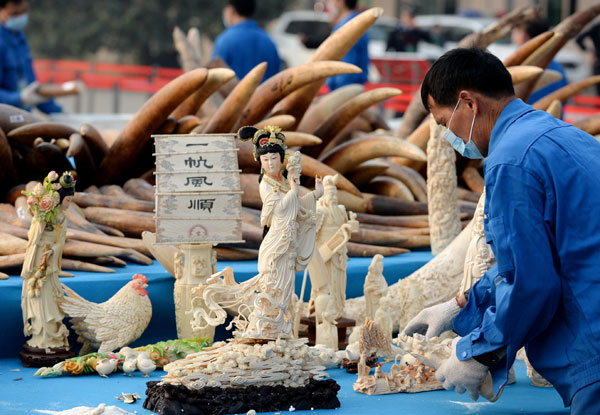China imposes ivory import ban
 0 Comment(s)
0 Comment(s) Print
Print E-mail China Daily, February 27, 2015
E-mail China Daily, February 27, 2015
China will impose a one-year ban on the importation of carved ivory items acquired after July 1, 1975.
The ban, which took effect on Thursday, was announced by the State Forestry Administration, China's wildlife watchdog.
It only affects ivory acquired after the Convention on International Trade in Endangered Species of Wild Fauna and Flora came into force.
"This action shows China's commitment to curbing the illegal ivory trade and to protecting African elephants," said Meng Xianlin, executive director-general of the Endangered Species Import and Export Management Office of China. "The one-year term will also provide time for us to observe and evaluate the actual effect of this act on the elephants."
"We also hope more policies will be introduced by more countries, especially African ones, that include habitat protection, law enforcement and ivory market management," Meng said.
Meng pointed to four sources of legal ivory - international legal ivory stockpile auctions, ivory acquired before 1975, ivory obtained through legal trophy hunting, and legal ivory-carved items obtained after 1975, mainly from Zimbabwe and Namibia.
Because of the legal ivory market, China has long been criticized for being the world's biggest ivory importer and blamed for African elephant poaching.
Between 2010 and 2013, about 100,000 African elephants were killed by poachers, according to a study published in Proceedings of the National Academy of Sciences.
However, official numbers show that the market for ivory in China - both legal and illegal - is shrinking. The number of wildlife smuggling cases last year dropped 70 percent from 2013, and the use of legal ivory for carved products dropped to about 80 percent in recent years.
"The investigation found that the scale of illegal ivory production is way smaller than legal production," Meng said
John E. Scanlon, secretary-general of the Secretariat of the CITES organization, spoke highly of China's work. It's not just China's responsibility, he said. Other countries need to take responsibility for their own plants and animals and take measures to protect them.
"We need support from source, transit and destination countries," Scanlon said. "China has been dealing with it responsibly as a destination country, showing great leadership through customs and other enforcement departments.
"Source and transit countries should do the same, taking their responsibility seriously and doing what they can. We are in this together."







Go to Forum >>0 Comment(s)